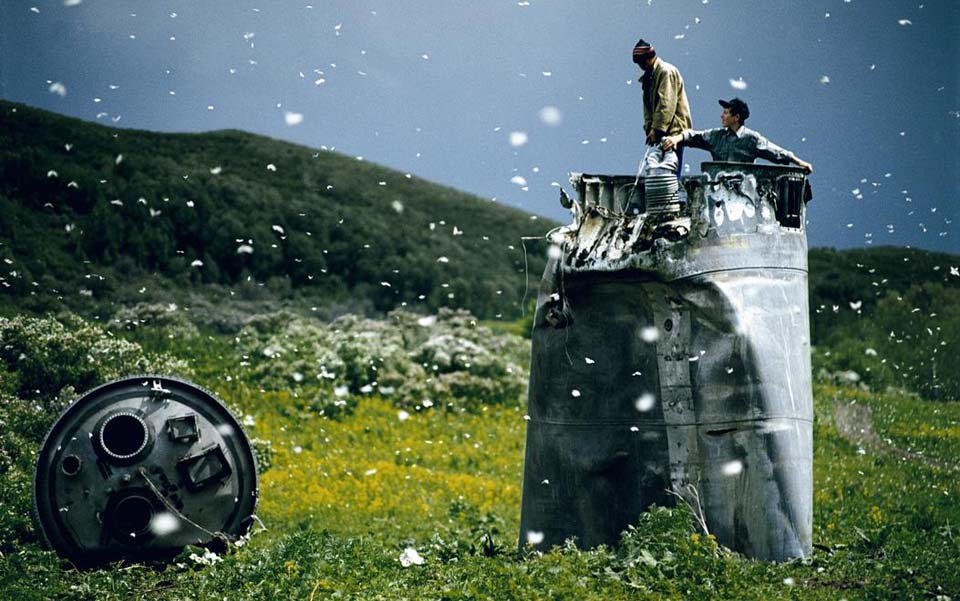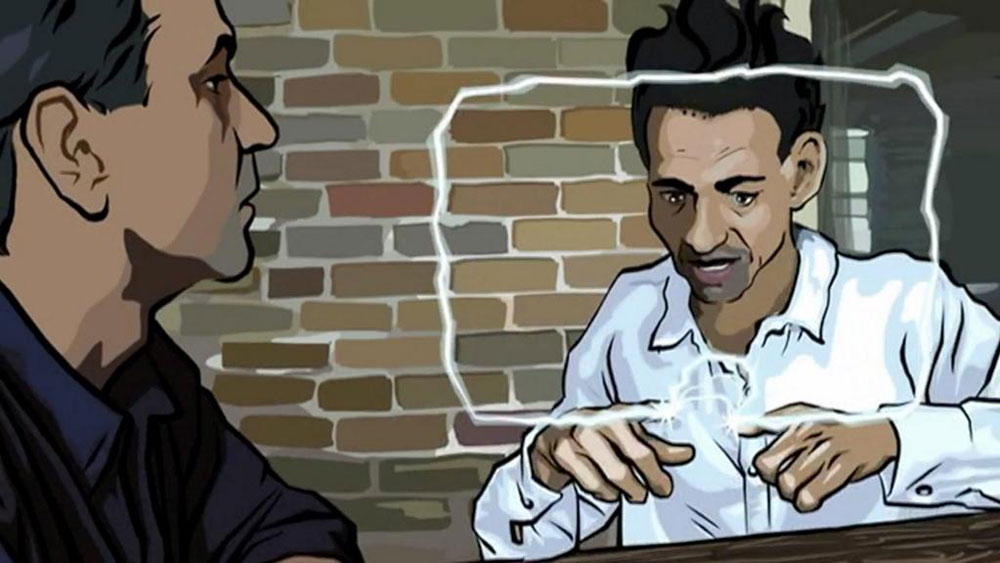The ideological dichotomy of ‘Right-’ and ‘Left-wing’ has had a good run. The ‘wing’ metaphor itself dates from the seating arrangements in the postrevolutionary French National Assembly, where supporters of King Louis XVI gathered to sit on the president’s right side and revolutionaries sat on his left. The scheme also recalls a traditional association of the left hand with suspicion (sinister is Latin for ‘left’) and the right with trust — in this case, trust in established authority. More than 30 years ago, a jet-setting Iranian playboy, transhumanist author and corporate consultant argued that this divide was due for a 90-degree rotation. F M Esfandiary — or ‘FM-2030’ as he began calling himself in the 1970s — predicted an axial shift to ‘up-wing’ and ‘down-wing’ political priorities. The directional associations in this new scheme were quite literal: ‘up‑wing’ meant looking toward the heavens, and ‘down-wing’ was looking toward the Earth.
FM-2030 was an inveterate up-winger whose vitrified corpse awaits resurrection at the Arizona cryonics mecca, Alcor. However, even as the ecology movement was gathering steam, FM-2030 failed to see that the down-wing tendency could generate at least as much passion as his own political faith. Nowadays, down-wingers proudly self-identify as ‘Greens’. As for the up‑wingers, they have begun to be colour-coded as ‘Blacks’ — and not simply because of their 1980s dress sense. The phrase ‘Black Sky Thinking’ was coined in a 2004 study by the centre-left UK think-thank Demos, and over the past decade it has increasingly been used to refer to schemes to make the whole inky expanse of the universe fit for human habitation.
FM-2030 himself understood this prospect in a rather abstract way. His chief preoccupation before he died in 2000 was the power to access information from any place at any time — the sort of ubiquity to which today’s smartphone owners can relate. His focus, in other words, was on communication not transportation. Nowadays, Black Sky researchers at the Lifeboat Foundation in the US and at the Icarus Interstellar foundation worldwide aim for something considerably more flesh-and-blood: to incorporate aspects of Earth’s natural habitat into vessels capable of an indefinite journey through space. This goal is almost the exact opposite of the aims of the Greens, who want to curb human aspirations to fit within what nature, in its Earthbound form, can reasonably be expected to sustain.
If FM-2030 was correct that the political landscape is gradually making that 90‑degree axial rotation, what would count as evidence that the ideological colour scheme is changing from red and blue (the traditional colours of the European Left and Right) to black and green? We can begin with the well-known disaffection of young people with politics as defined in Right-Left terms and their spontaneous visibility in key Black and Green projects.
On the Black side, we have the DIYbio (Do-It-Yourself Biology) movement that tries to reverse-engineer organisms in much the same way that one might convert an ordinary car into a drag racer. George Church, the Harvard medical geneticist who promotes the resurrection of extinct species, sees in DIYbio the first truly grassroots-advanced science, or ‘synthetic biology’. DIYbio enthusiasts happily transfer already existing DIY ‘open source’ attitudes from computer code to genetic code, which renders the organism a site of tinkering and troubleshooting. Their default stance is libertarian, evading and sometimes even mocking the scientific short-sightedness of conventional morality. However, unlike libertarians, they also generally believe in grand ‘technological fixes’ for the world’s problems — an attitude that the scourge of Silicon Valley, the technology writer Evgeny Morozov, regularly derides as ‘solutionism’. In this guise, often conspicuous in TED talks, Black-siders look less like Friedrich Hayek-style Right-wingers and more like social engineers in the 19th-century socialist tradition of Henri de Saint-Simon and Auguste Comte.
On the Green side, we have the original calls for ‘animal liberation’ that date from the 1970s, when a radical offshoot of the environmental movement began to break into laboratories that housed animals for use in medical and cosmetics tests. The activists lumped the two kinds of research together as evidence of humanity’s selfishness and delusion. For them, the ultimate value of humanity lay in our Earthly nature. Our focus should not be on what distinguished us from other forms of life, they believed, but on what united us.
In this context, the threat of a global ecological crisis has served the Greens well. It has given them a normative rubric according to which our sacrifice of animals reflects a more general disregard for the planet, one that could undermine life itself. The old Left’s rhetoric of justice is apparent in the Green movement. At the same time, by removing the idea of human privilege, the Greens find allies on a traditional Right that resonates to the idea of a natural order ultimately reasserting itself.
So far I have portrayed this ideological rotation from the standpoint of a younger generation that accepts it as a given — often, to be sure, having been guided by prescient elders. But what is the evidence that the traditional Right and Left are dividing in ways that matter in this new down-up orientation? As I have already suggested, the up-winging Blacks combine the old libertarian Right and the old technocratic Left, while the down-winging Greens bring together elements of the old conservative Right and the old communitarian Left.
For some readers — again, perhaps, younger ones — the Black and Green political alignments might appear clearer and more intuitive than the original Red and Blue ones. Here it is worth recalling that the main bone of contention between Left and Right in the modern era has been the state’s prerogative to deliver social justice. On the whole, this is a duty that the Left recognises but the Right does not. Even so, the reasons for taking either position have varied significantly within each camp. The technocratic Left has seen social justice as part of a larger agenda of social progress, whereas the communitarian Left has tended to focus on the need to secure a decent quality of life. The libertarian Right has dismissed the very idea of social justice as inherently authoritarian, while the conservative Right has sought a more ‘natural’ form of justice in such pre-modern institutions as the church and the family.
In the old Left-Right dialectic, the ‘state’ stands for a peculiarly modern corporate agent that has been granted perpetual authority to make laws, administer to basic needs, and promote prosperity for a human population living within a generally recognised territory. To older readers, this point will seem obvious. However, I spell it out because in a world where people are increasingly affiliating across national borders and species boundaries, and where some even aspire to discover extraterrestrial intelligence, the state might seem much less salient, even an outright obstacle. From this perspective, the basic dilemma that has defined the Left-Right divide for the past two centuries — to extend or limit state power? — starts to look a bit stale.
And this is before we consider the state’s striking failure to deliver on its own promises of social justice — what Marxists, in a great piece of rhetorical distancing, have dubbed ‘the fiscal crisis of the welfare state’. The persistence (if not resurgence) of poverty, inequality and ethnic discrimination, despite a succession of well-intentioned, often well-financed and indeed sometimes partly successful welfare programmes has put the Left on the defensive since the 1980s. The situation here recalls one that the precursors of the modern Right faced in the 1780s, when the long-term viability of the Church-backed monarchies of Europe came into serious question. That loss of faith resulted in the French Revolution and the advent of the aforementioned Left-Right divide. The 1980s were likewise marked by widespread scepticism of the dominant narrative — no longer the providential hand of God but rather the march of human progress. And in both cases, the leading political response was a paternalistic attitude toward the poor that focused on securing their material existence in what was increasingly presented as a high-risk environment, rather than aiding their passage up any spiritual or social ladder.
Informing this sensibility is a more general metaphysical belief that there are objectively ‘natural’ and ‘unnatural’ ways of being human
Karl Polanyi’s classic The Great Transformation (1944) provides a rich sense of the affinities between classic ‘Tory’ paternalism and the modern welfare concerns of the communitarian Left. Indeed, these tendencies are due for a formal reunion within the Green movement in the impending rotation of the ideological axis. Sophisticated conservative thinkers such as the English philosopher Roger Scruton have already made the connection. The shift from Red to Green can also be seen in the curious revival of Aristotelian modes of thought in thinkers who identify with the Left. Here, ‘Aristotelian’ refers to an emphasis on ‘human nature’ as both a biological and a normative entity that requires specific sorts of environments for its full realisation. Informing this sensibility is a more general metaphysical belief that there are objectively ‘natural’ and ‘unnatural’ ways of being human, for which history is our most reliable source.
Among elements of the contemporary Left who have made the turn to Aristotle, consider these three high-profile cases. First is the ‘capacities’ approach to ‘quality of life’ promoted by the Indian economist Amartya Sen and the American philosopher Martha Nussbaum. This shifts the justification of the welfare state away from the rational assent of its potential members — as in John Rawls’s A Theory of Justice (1971) — and offers instead a social scientist’s inventory of the necessary attributes of a decent human life, regardless of assent. Second is the American political philosopher Michael Sandel’s proposition that most features of social life possess intrinsic virtues developed through their traditions of practice, but that these virtues are compromised if standards borrowed from science, technology or the market are used to reform their spheres. Lastly, there is the German sociologist Jürgen Habermas, who has come to share the Roman Catholic Church’s view that genetically based interventions in the unborn, even when they don’t threaten life, nevertheless abrogate the natural basis of human autonomy.
I have characterised the turn to Aristotle on the part of the Left as ‘curious’ because it flies in the face of all modern biological science, which from the 19th-century naturalist Jean-Baptiste Lamarck onward has increasingly stressed the conventionality of species categories and the plasticity of organisms. Of course, it does not follow that we can now reverse-engineer any species as we please. Nevertheless, as the DIYbio movement suggests, scientists are spontaneously taking us along that trajectory, which draws us further away from Aristotle’s metaphysical starting point. More importantly, a hallmark of the modern Left’s political commitment to large-scale, long-term social transformation has been a belief that human beings can be substantially changed for the better under the right circumstances. Indeed, this belief has been common to all the social sciences in the modern era from psychology and economics to sociology and political science. That belief is still carried forward by the up-wingers. It appears to have been abandoned by the down-wingers, including those of the communitarian Left, who subscribe to the idea of ‘natural limits’ to human self‑transformation.
Where should we look to see the libertarian Right and the technocratic Left making common cause in support of that great up-winging tendency championed by FM-2030? One place is the Breakthrough Institute, a US-based environmental think-tank that sees capitalist investment in advanced science and technology as the key to humanity’s survival on Earth, and possibly beyond. Most of its members appear to be Left-leaning, but whatever commitment to socialism they might have, it is one that sees itself as building upon — not abandoning — capitalism, very much as Saint-Simon and Karl Marx once did. Their various cases for experimental approaches to new energy sources reveal a fundamental optimism about the human condition, whereby every new existential threat is an opportunity in the making.
Following the wording used by Max More, the transhumanist philosopher and president of Alcor (where FM-2030’s body is kept on ice), I have described the underlying ethic of this approach as proactionary: it actively seeks calculated risks, rather than avoiding them in accordance with the opposing ‘precautionary’ principle. To be sure, the bracing character of the proactionary ethic is the very opposite of the default paternalism of down-wingers. Nevertheless, it might provide the more convincing account of our distinctiveness as a species, whether or not we survive in the long run.
With thanks to Emilie Whitaker for inspiration.
24 October 2013
Comments
-
Gyrus
-
Lester
-
drokhole
-
Lester
-
-
-
Guest
-
http://www.facebook.com/profile.php?id=1364224013 Chris Groves
-
http://www.facebook.com/profile.php?id=1364224013 Chris Groves
-
http://profiles.google.com/barry.kort Barry Kort
-
http://thewayitis.info/ Derek Roche
-
http://www.facebook.com/profile.php?id=1364224013 Chris Groves
-
http://thewayitis.info/ Derek Roche
-
Chris Groves
-
http://thewayitis.info/ Derek Roche
-
Steve Fuller
-
http://thewayitis.info/ Derek Roche
-
-
-
-
-
Alex Evans
-
http://www.aeonmagazine.com/ Ed Lake
-
Steve Fuller
-
-
Gyrus
-
Steve Fuller
-
Gyrus
-
Steve Fuller
-
Gyrus
-
-
-
-
-
Mark Gubrud
-
Cahokia
-
Mark Gubrud
-
-
-
rameshraghuvanshi
-
reason60
-
Steve Fuller
-
G
-
-
-
Trimegistus
-
Nom de Plume
-
Steve Fuller
-
Nom de Plume
-
Oliver Milne
-
-
-
-
Matt Baen
-
Steve Fuller
-
Cahokia
-
-
Adam
-
Steve Fuller
-
Gyrus
-
Steve Fuller
-
Gyrus
-
Steve Fuller
-
Gyrus
-
Lester
-
Chris Groves
-
Matt Baen
-
-
-
-
-
Cahokia
-
kristoferpettersson
-
RedneckCryonicist
-
Ryan






